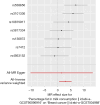Percentage of fat in milk consumption and risk of six cancers: a Mendelian randomization study
- PMID: 39816557
- PMCID: PMC11730444
- DOI: 10.21037/tcr-24-802
Percentage of fat in milk consumption and risk of six cancers: a Mendelian randomization study
Abstract
Background: The causal relationship between percentage of fat in milk consumption and cancer risk lacks sufficient investigation. The purpose of this study was to explore whether the percentage of fat in milk consumption is a factor that affects the risk variation of several common types of cancer.
Methods: Mendelian randomization (MR) was performed to estimate the unconfounded causal relationship between the percentage of fat in milk consumption and the risk of six cancers related to milk intake, as well as to assess the associations between body fat percentage and these cancers. Data corresponding to the percentage of fat in milk consumption (n=411,503), body fat percentage (n=401,772), breast cancer (n=139,274), ovarian cancer (n=66,450), endometrial cancer (n=121,885), colorectal cancer (n=32,072), prostate cancer (n=140,254), and bladder cancer (n=373,295) were obtained from the Integrative Epidemiology Unit (IEU) or the genome-wide association study (GWAS) Catalog databases. The primary analytical strategy employed the inverse-variance weighted (IVW) method. Sensitivity analysis, including assessments of heterogeneity and pleiotropy, was conducted to assess the robustness of the findings.
Results: The percentage of fat in milk consumption only exhibited a causal relationship with breast cancer (β=2.993, P=0.01). The study identified significant causal effects of body fat percentage on the risk of several cancers, including ovarian cancer (β=0.225, P=0.002), endometrial cancer (β=0.669, P<0.001), and colorectal cancer (β=0.344, P<0.001), as well as a protective effect on prostate cancer (β=-0.104, P=0.046). Sensitivity analysis demonstrated that the findings were robust.
Conclusions: Our study findings indicated that a higher percentage of fat in milk consumption was associated with an increased risk of breast cancer, providing valuable insights for cancer prevention strategies among the European population.
Keywords: Fats; Mendelian randomization analysis (MR analysis); milk; neoplasms.
2024 AME Publishing Company. All rights reserved.
Conflict of interest statement
Conflicts of Interest: Both authors have completed the ICMJE uniform disclosure form (available at https://tcr.amegroups.com/article/view/10.21037/tcr-24-802/coif). The authors have no conflicts of interest to declare.
Figures
Similar articles
-
The causal effects of genetically predicted alcohol consumption on endometrial cancer risk from a Mendelian randomization study.Sci Rep. 2024 Feb 12;14(1):3478. doi: 10.1038/s41598-024-53926-z. Sci Rep. 2024. PMID: 38347022 Free PMC article.
-
Skimmed milk intake reduces the risk of ER- breast cancer: a Mendelian randomization analysis.Discov Oncol. 2024 Nov 2;15(1):612. doi: 10.1007/s12672-024-01448-5. Discov Oncol. 2024. PMID: 39487869 Free PMC article.
-
Causal associations between liver traits and Colorectal cancer: a Mendelian randomization study.BMC Med Genomics. 2023 Dec 6;16(1):316. doi: 10.1186/s12920-023-01755-w. BMC Med Genomics. 2023. PMID: 38057864 Free PMC article.
-
Mendelian randomization unraveled: gender-specific insights into obesity-related phenotypes and colorectal cancer susceptibility.Front Endocrinol (Lausanne). 2024 Jun 6;15:1322253. doi: 10.3389/fendo.2024.1322253. eCollection 2024. Front Endocrinol (Lausanne). 2024. PMID: 38904048 Free PMC article.
-
Causal effects of BMI, waist circumference, and body fat percentage on the risk of bladder cancer: A Mendelian randomization study.Medicine (Baltimore). 2024 May 17;103(20):e38231. doi: 10.1097/MD.0000000000038231. Medicine (Baltimore). 2024. PMID: 38758881 Free PMC article.
References
-
- Schlander M, van Harten W, Retèl VP, et al. The socioeconomic impact of cancer on patients and their relatives: Organisation of European Cancer Institutes task force consensus recommendations on conceptual framework, taxonomy, and research directions. Lancet Oncol 2024;25:e152-63. 10.1016/S1470-2045(23)00636-8 - DOI - PubMed
LinkOut - more resources
Full Text Sources

